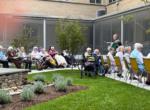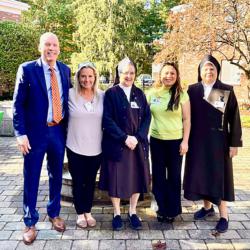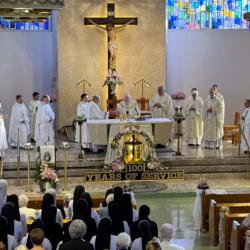Contributions of Black Catholic community celebrated at Healy Award Dinner
COLUMBIA POINT -- According to Danielle M. Brown, Esq., the associate director of the U.S. Conference of Catholic Bishops Ad Hoc Committee Against Racism, every American city has its own unique melody.
When Brown is in Boston, the melody she hears is "part Irish ballad, part Negro spiritual."
Speaking at the 30th annual Bishop James Augustine Healy Award Dinner at Boston College High School on Nov. 11, Brown's words lived up to the dinner's purpose of celebrating the history, culture, and contributions of Boston's Black Catholic community.
"I have come to believe, brothers and sisters," she said, "that wherever Black Catholics are, is hallowed ground."
For the last 30 years, the Healy Award has gone to an outstanding Black Catholic in the Archdiocese of Boston. It is named after the first known African American to become a Catholic priest and bishop. A non-Black Catholic who has made a substantial impact on Boston's Black Catholic community receives the Robert L. Ruffin Award. One of the most prominent Boston Black Catholics of his day, Ruffin championed Catholic education for Black youth and led the Boston delegation at the first Black Catholic Congress in 1889.
In his blessing, Cardinal Seán P. O'Malley praised "all the Black Catholics who have made such incredible contributions to the life of our church and society."
This year's Healy Award went to Sister Marie-Therese "Tess" Browne, a Sister of Charity of Nazareth and co-chair of the Social Justice Committee of St. Katharine Drexel Parish in Roxbury. This year's Ruffin Award was presented to Father J. Bryan Hehir, the Archdiocese of Boston's secretary for social services and a fixture in social justice ministry.
"I am absolutely thrilled and amazed that we're able to honor and celebrate people who have done so much within the Black Catholic community," Lorna DesRoses, the Archdiocese of Boston's evangelization consultant for Black Catholic communities, told The Pilot. "They're wonderful examples of faith, examples of service, examples of leadership."
Sister Tess, as she is known, was born on the Caribbean island of Trinidad. She began her social justice ministry in the U.S. when she joined striking farm workers on the picket lines. As director of the National Farm Workers Service Center in Texas, she lobbied for legislation requiring that farm workers have access to toilets and clean drinking water on the job.
Upon moving to Boston, she became an organizer with the Committee for Boston Public Housing and the Mass Action for Women Audit. She has led campaigns for voting rights, women's rights, affordable healthcare, affordable housing, racial equality, and environmentalism. She has also served on the advisory boards of the Umass Boston Labor Resource Center, the Center for Women in Politics and Public Policy, and the South Asian Labor Center.
St. Katharine Drexel Executive Assistant and 2018 Ruffin Award recipient Carolyn Caveny said that Sister Tess's "unflinching focus on justice is congruent with the life of Jesus."
In her remarks, Sister Tess thanked all of those who came before her, and asked all religious sisters in the room to stand up and be recognized. She pointed out that November is both Black Catholic History Month and Diwali, the Hindu festival of lights. Therefore, she said, it was an opportunity for those at the dinner to "bring some light to a dark world."
"Remember, some people say when it's dark or black, it's negative," she said. "But remember, the soil is dark. The seeds have to be in darkness for something to come out."
Sister Tess said that her entire career has been based on the philosophy of bringing God to the people no matter where they are. Her Franciscan tradition tells her that "the world is our cloister."
The theme of this year's dinner was Sankofa, part of the West African proverb "Se wo were fi na wosankofa a yenkyi." The proverb advises that it is important to look back on the past as well as toward the future.
Sister Tess concluded her remarks by saying: "We look back, but we've got to go forward. We've got to lift one another up, we've got to lean on each other and keep going."
Rashaun Martin, a lifelong parishioner of St. Katharine Drexel and 2018 Healy Award recipient, said that when Black Catholics felt forgotten by the Archdiocese of Boston, Father Hehir reached out to them.
"He basically said, 'Guys, I have your back,'" Martin said. "In America, the Black community, we need allies, but most importantly, we need champions. We need folks, especially those in positions of authority, to not only stand up for us, but also speak for us."
In his remarks, Father Hehir said that being able to help Boston's Black Catholic community is "a gift I'll take to my grave."
"It means so much because the significance of the Black Catholic community in the Boston Archdiocese means so much to the community as a whole," he said.
The evening featured performances by Chorale Fraternite, the Haitian community choir of the Catholic Tri-Parishes of Brockton, and the Archdiocese of Boston Black Catholic Choir. The Black Catholic Choir sang works composed and conducted by M. Roger Holland II, professor of music and religion at the University of Denver. Holland's song "All of Me" was inspired by the words of Sister Thea Bowman, one of six Black Catholics currently being considered for sainthood.
Addressing the U.S. Conference of Catholic Bishops, Sister Thea famously said: "What does it mean to be Black and Catholic? It means that I come to my church fully functioning. I bring myself; my Black self, all that I am, all that I have, all that I hope to become."
"Regardless of cultural or ethnic background," Holland said, "should that not be how we all enter into the liturgy? We should bring all of who we are as a gift to the church, as a sacrificial offering unto the Lord."


















